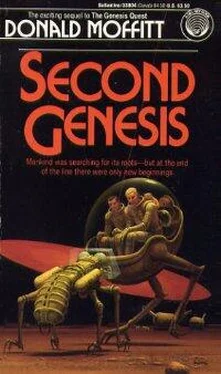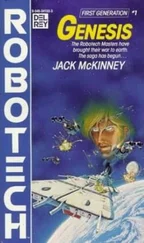Yggdrasil groaned and creaked with the stresses of acceleration. The tree didn’t like this at all. It had come into this system under its own power—the ramjet having been shut down at about one hundred astronomical units—and finished the last seven percent of braking with its lightsails. It had broken out of its hyperbola and taken up its present orbit under the hormonal and mechanical inveigling of its human passengers, and it was just settling down to enjoy the sunlight only to be subjected to the rude yank of the tether again.
Slowly, the tree began to outdistance the gnats that were pursuing it. The one-hundred-thousand-mile orbit straightened out into a larger curve. The pursuing craft were in no danger from the photon exhaust yet, but they would be when their interception trajectory intersected the line where Yggdrasil had been.
After an hour, when the tree had built up a velocity of twenty miles a second and it became obvious that the gap would continue to widen, radar showed that the dragonfly landing stages had simultaneously flip-flopped.
“Now, why would they do that?” Bram asked.
“I’m afraid I know,” Jun Davd said.
The answer came a moment later. Once again, a cloud of orange sparks twinkled into life. The burn lasted for several minutes, then extinguished.
“They used their retrorockets to give themselves an extra boost!” Bram said unbelievingly. “There’s no way they can come to a soft landing on the Moon, now! All they can hope to do is—”
“Crash into Yggdrasil,” Jun Davd finished for him. “Project our delta-vee and gamble that by the time they intersect our path, the angle will be acute enough and the relative velocity close enough to zero to enable them to survive the crash.” His face was somber. “They don’t care about being able to get back, of course.”
Bram scrambled for a console and punched out figures, while Mim watched him, biting her lip in apprehension. After a bad couple of minutes, he gave her a reassuring smile and turned to Jun Davd.
“They can’t catch up to us,” he said.
A general sigh of relief went through the observatory, though anxiety still showed on many faces.
Jun Davd said, “No, an eye—even a wondrous thing like a dragonfly eye—isn’t a computer. Orbital interceptions can be misleading. But they had to try. It seems to be an imperative with them. Spread their wings, figuratively speaking—the wings they haven’t got—and set out for new worlds. Nature can be profligate. It doesn’t matter if most don’t survive.”
Something like pity appeared on Mim’s face. “Can they be rescued, Jun Davd?”
“I doubt that the lunar dragonflies would care to make the effort,” Jun Davd said. “Their territory’s overcrowded as it is. In any case, the question is immaterial.”
It took another hour to demonstrate that. Jun Davd slid back the cover of the observation well in the floor. It gave a good view backward along their line of flight, between the twin puffs of foliage and foliated root. The people in the observatory crowded around the safety rail and stared downward.
Jun Davd fiddled with dials, and the tough, transparent membrane became a magnifying lens. The expanse of tree crown fled past in a blur as the focus came to rest somewhere beyond. Filters masked the glare of the caged sun, spitted on the slender shaft of the probe; the darkened circle of eclipse also made bearable the beam of virtual photons, briefly swollen with abnormal energy by a factor of ten billion before it satisfied quantum theory by decaying into pions.
The swarm of dragonfly vehicles peppered the view. They were harshly lit on the side facing the hadronic beam, and their shape could be clearly seen as squat bells, with the spent cone of the descent engine for a clapper.
“No way they can stop,” Jun Davd said. “Nor can we.”
The beam was very tight, but there was a certain amount of scattering. To the watching humans, it seemed that each bell instantly evaporated while still some distance away. One by one, they flicked out of existence, soaked up by the terrible light.
In minutes, space was swept clean of the glittering cloud.
“We’re safe,” Dal said. “Let’s get out of this cursed system.”
He spoke too soon. Yggdrasil’s straightening course was taking it past the Moon. It lay before them, huge and yellow through the grand observation blister that formed one wall, Through sulfurous wisps of clouds could be seen a landscape of round lakes, patches of sparse unhealthy vegetation, pocked scars softened by weather, oily seas dotted with ring islands that had once been craters.
And popping up through the murky atmosphere was a shower of orange sparks.
An alarm went off. Jun Davd picked up the interphone, said “I see them,” and hung up.
Bram was already busy at the computer touch board. Jun Davd leaned over his shoulder to see what he was entering, nodded approval, and started feeding in supplementary data from the tree’s sensors.
“What can they hope to accomplish?” Bram whispered when the answer appeared on the screen. “At best they’ve matched roughly for our present velocity. Those vehicles could be waiting for us in our projected flight path if we stopped accelerating in the next decihour. But we’re still boosting. They’ll only end up behind us, like the others, and get themselves vaporized in our drive exhaust.”
“Then they must expect us to stop accelerating,” Jun Davd said.
“Missiles,” exclaimed Alis Tonia Atli, then had to explain the specialized meaning of the word from her knowledge of twentieth-century earth history.
“No,” Jun Davd said. “We’d have seen them by now. At any rate, they wouldn’t do much better at catching us than those piloted craft. It has to be something faster.”
“A fusion exhaust,” said Dal. “Remember how reckless they were with it around the diskworld? They might not quail at using it this close to home. And they might not realize Yggdrasil’s combustible. If all they want to do is kill the probe and stop us, they. wouldn’t mind turning us into a ball of slag. We’d be another moon to settle on—bigger than most of those they use.”
“There’s nothing the size of their interstellar ship in orbit,” Jun Davd said. “I’m sure they launch them as soon as they make them. The largest objects I see in orbit are those bulky cylindrical structures attached to mirrors—” He stopped.
“Light,” Bram said. “Light would be fast enough.”
Jun Davd looked shaken. “I thought they had something to do with solar power. I can see that even now we don’t fully understand these creatures. They’ve mounted laser defenses against unwanted colonization by their brethren on Earth.”
Even as he spoke, the laser beams struck Yggdrasil. There was a flickering of images on the big screen as some of the antennae elements dispersed across Yggdrasil’s crown burned out, then the computer redistributed data to compensate. Bram saw the beams, hundreds of them, sending their threads of light through space in a complex skein that focused on Yggdrasil. The computer had assigned different colors to the threads to distinguish the types of lasers—violet, red, blue, green, magenta, and a deadly gray to represent x-rays.
One of the visitors went into hysterics, a little round man who was calmed by two women and given a glass of water.
Bram reached for the interphone before he remembered that he was no longer year-captain. He turned to Jun Davd. “Somebody should get Enyd to rotate the tree—distribute the heat absorption. Even though we’re boosting, another few percent of g wouldn’t—”
“We needn’t bother,” Jun Davd said. “We couldn’t get rotation started fast enough. Besides…”
Читать дальше












